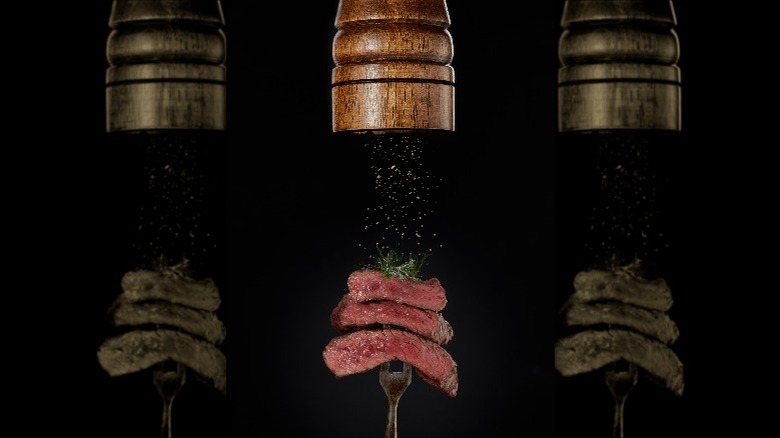PETA Is Unimpressed With Salt Bae's Restaurants For Obvious Reasons
People for the Ethical Treatment of Animals (PETA) has added their name to the growing list of detractors of Salt Bae, the viral salt sprinkler that has managed to establish restaurants across the globe. As opposed to his employees who have sued him for allegedly exploitative practices, PETA's complaint should not come across as a revelation. They unsurprisingly take issue with his steaks.
LADbible relates the specific issue Dawn Carr, director of vegan corporate projects at PETA, has with Salt Bae: "Even the extortionate prices can't distract from the reality of what – or rather who – is on his menus." The steakhouse sells steaks, a fact that PETA thinks everyone else overlooks due to the viral videos about how much it costs to dine there. She added that even Marco Pierre White was looking into vegan steaks and said Salt Bae should follow suit.
Really, the fact that PETA made this statement is like observing that water is wet. It might be more of a surprise that taken the organization this long to run a press campaign against the expensive steakhouse.
The environmental issue PETA raised
LADbible also noted Dawn Carr's stance that Salt Bae's expensive steaks turn a harmful environmental impact into an overly decadent luxury: "Cows don't want to die for our meals, and raising animals to eat them is an environmental disaster. The most exquisite restaurants, state-of-the-art Michelin-starred chefs, and sophisticated consumers know that ... decadent vegan foods – of which there are plenty – are always the finest choice." While Salt Bae has been called out by a Michelin-starred chef who argued the steaks aren't worth the expense, the environmental question is worth considering more directly.
As The Guardian reported in 2018, the environmental impact of beef, in particular, outstrips all other meats because of the massive infrastructure needed to produce the meat. Producing chicken and pork led to a fifth of the emissions, used 11 times less water, and took up 28 times less land than beef. It both emits gasses and destroys the local habitat that would somewhat mitigate such emissions.
The increasingly common question is whether lab-grown meat will replace the traditional version. Last year, The World Economic Forum wrote that while the industry will have to grapple with issues posed by cultured meat, such a product could be the transition away from farmed beef. But the real question, obviously, is whether Salt Bae would switch to cultured meats in an attempt to silence PETA's criticism of his business model.

